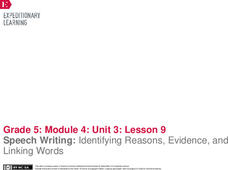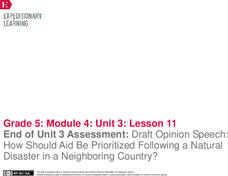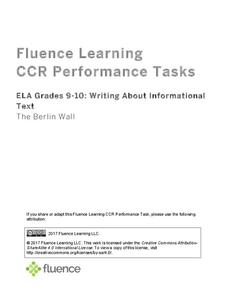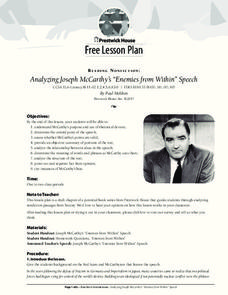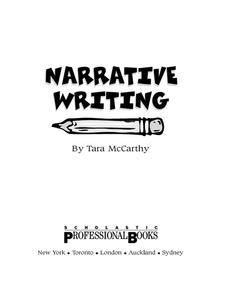EngageNY
Speech Writing: Identifying Criteria for a High-Quality Introduction
Using a helpful resource, pupils watch a TED Talk of an opinion speech as they consider the criteria for a high-quality introduction. Scholars then engage in a shared writing process with the teacher to practice writing the introduction...
University of North Carolina
Speeches
A handout on speeches, part of a series on specific writing assignments, helps individuals develop their speech-writing skills. The resource starts with a discussion on audience and purpose and ends with tips to engage the audience.
EngageNY
Speech Writing: Identifying Criteria for a High Quality Conclusion
Learning is never-ending. Scholars learn about effective conclusions as they continue watching a video of an opinion speech. After analyzing the speech's conclusion, they work in small groups to write an ending for their own speeches.
EngageNY
Speech Writing: Identifying Reasons, Evidence, and Linking Words
Enjoy the view. Scholars continue viewing a video of an opinion speech, this time identifying the supporting evidence the speaker employs. After watching, they work in small groups on their shared writing projects, crafting a body...
EngageNY
Final Performance Task: Critique and Revision, Part II
Stop ... grammar time! Pupils complete worksheets to practice using the correct verb tense and identify correlative conjunctions. Next, scholars apply their new grammar skills to edit their draft opinion speeches.
EngageNY
End of Unit 3 Assessment: Draft Opinion Speech: How Should Aid Be Prioritized Following a Natural Disaster in a Neighboring Country?
Put it to the test. With the cumulative resource, pupils complete the End of Unit 3 Assessment. Using everything they've learned in the unit, they write a draft of an opinion speech about how to prioritize aid after a natural disaster.
Fluence Learning
Writing About Informational Text The Berlin Wall
On June 26, 1963 President John F. Kennedy delivered his famous "Ich bin ein Berliner" speech close to the Berlin Wall at the Rudolph Wilde Platz. On June 12, 1987 President Ronald Reagan Delivered his famous "Mr. Gorbachev, tear down...
ReadWriteThink
Analyzing Famous Speeches as Arguments
A speaker, a message, an audience. After analyzing these elements in Queen Elizabeth's speech to the troops at Tilbury, groups analyze how other speakers use an awareness of events, and their audience to craft their arguments....
Grammaropolis
Grammaropolis - Complete Edition
Allow the residents of this grammar-packed city to teach your pupils the parts of speech with songs, videos, quizzes, and more. Kids can get to know each part of speech and sing along with the catchy tunes!
Prestwick House
Reading Nonfiction: Analyzing Joseph McCarthy's "Enemies from Within" Speech
Looking for a lesson plan that teaches class members how to analyze nonfiction? Use Joseph McCarthy's famous "Enemies from Within" speech as a instructional text. Worksheet questions direct readers' attention to the many historical...
K20 LEARN
Speak Up! Four Categories Of Speeches
High schoolers examine the four major types of speeches: informative, demonstrative, persuasive, and extemporaneous. Groups then select one type and craft and share a presentation highlighting this format's characteristics. Finally,...
Bermingham City Schools
Opinion Writing
It's no secret that children can be very opinionated, but rather than fight against this natural tendency, embrace it with this primary grade writing project. After a shared reading of a children's book about persuasion, young learners...
Scholastic
Narrative Writing
If you're looking to start a unit based around narrative writing, make sure to consider this resource while you're planning. This book covers five topics: writing personal narratives, writing narratives about others, writing narratives...
EngageNY
Mid-Unit 3 Assessment, Part II: Organizing Notes for a Public Speech
It's all a matter of opinion! Pupils take Part II of the mid-unit assessment, in which they continue organizing their notes in preparation for writing an opinion speech. Using the resource, they add reasons, evidence, and a concluding...
EngageNY
Mid-Unit 3 Assessment, Part I: Short Constructed Response and Organizing Notes for a Public Speech
It's time to put pen to paper. Scholars complete the first part of the mid-unit 3 assessment, writing a short constructed response about international aid following a natural disaster. Next, pupils use informational texts and note...
Fluence Learning
Writing an Argument: Free Speech
How do you assess whether pupils have mastered certain concepts and skills? Designing a performance task that asks learners to demonstrate their skills and providing writers with a rubric that identifies these skills and provides...
Santa Monica-Malibu Unified School District
Parts of Speech Adjectives: Building Blocks of Grammar
How do you describe a jellyfish? Individuals write adjectives for Nomura's jellyfish, take notes, and check understanding with a formative assessment. Notes include the definition for adjectives, guiding questions to help writers...
EngageNY
Writing a Position Speech: Which Food Chain Would Be Best?
Eeny, meany, miny, moe. It's time to choose a side. Scholars learn about taking a position by watching a video of a speech about local organic food. Next, pupils use graphic organizers to plan their speeches about which food chain is...
Santa Monica-Malibu Unified School District
Parts of Speech Verbs: Building Blocks of Grammar
Pupils begin with a brain teaser, take notes, and formatively check understanding with a Chinese proverb. In addition to parts of speech, the resource also includes information about parts of a sentence. Teachers may extend instruction...
K20 LEARN
The War of the Words: Grammar and Parts of Speech
Here's a activity that adds some zip to a study of parts of speech. Class members read two versions of the same article, one loaded with evocative nouns, verbs, adjectives, and adverbs, while the other is missing this sensory language....
Literacy Design Collaborative
Elie Wiesel's Acceptance Speech Analysis
Elie Wiesel's Nobel Prize Acceptance speech provides young historians with an opportunity to demonstrate their ability to use evidence from the speech. They work together to analyze how Wiesel uses rhetorical devices and syntax to...
University of Minnesota
Writing for Success
You can be a success! Scholars learn skills required for successful writing with a step-by-step process. They begin with the basics of parts of speech, such as indefinite pronouns, and writing a simple sentence. Individuals then build...
EngageNY
End of Unit Assessment: Presentation of Position
What is the difference between formal and informal language? Pupils rewrite their position speeches to adapt them for an audience of adults. Next, they present their speeches in small groups, attempting to answer the question, "Which...
Franklin D. Roosevelt Presidential Library & Museum
Pearl Harbor Activity #2: Why Do Words Matter?
Words matter! That's the big idea behind an activity that asks scholars to replace words in FDR's "Day of Infamy" speech with synonyms. They then listen to a recording of President Roosevelt's address and compare his version to their own.





